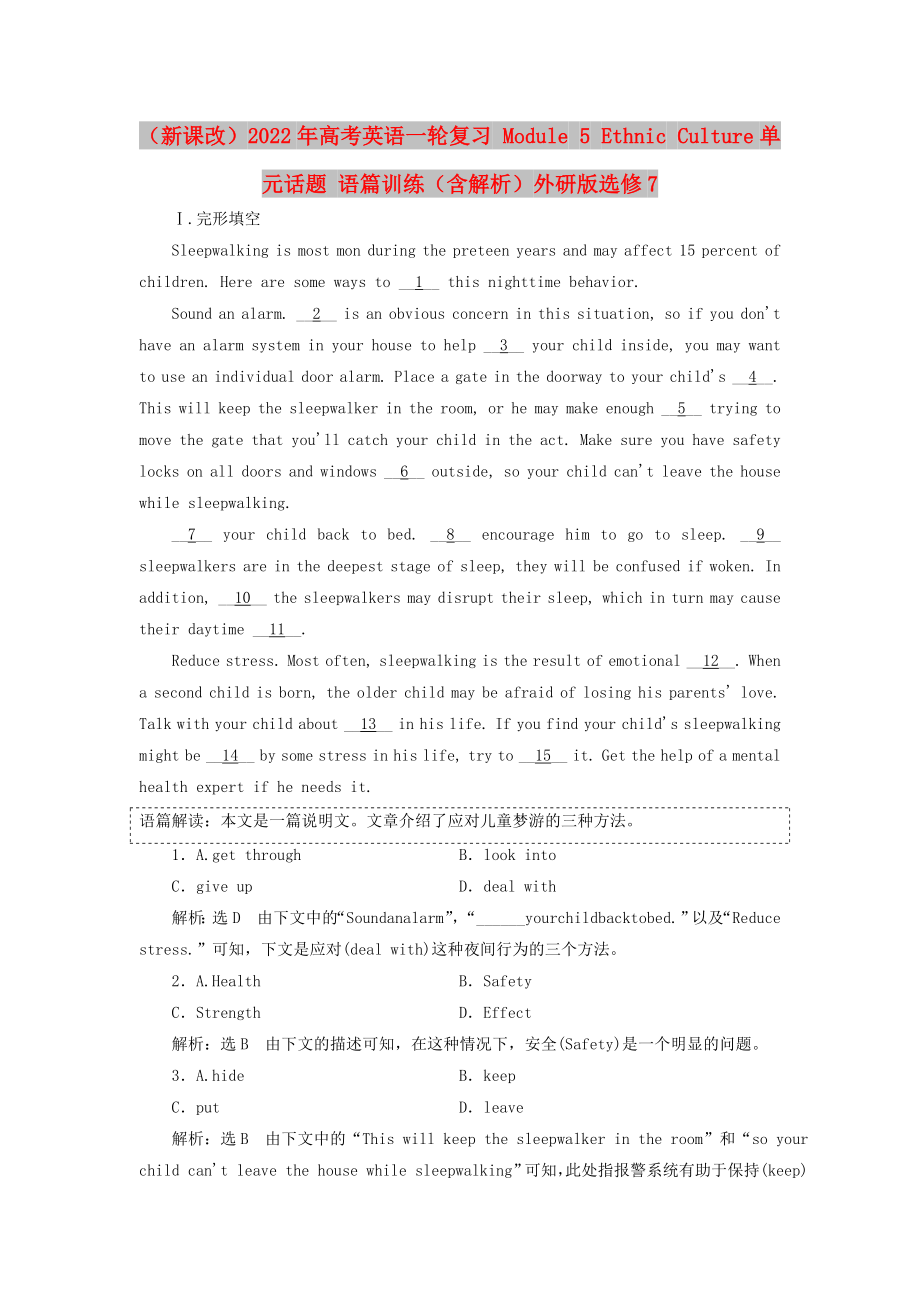《(新課改)2022年高考英語(yǔ)一輪復(fù)習(xí) Module 5 Ethnic Culture單元話題 語(yǔ)篇訓(xùn)練(含解析)外研版選修7》由會(huì)員分享����,可在線閱讀����,更多相關(guān)《(新課改)2022年高考英語(yǔ)一輪復(fù)習(xí) Module 5 Ethnic Culture單元話題 語(yǔ)篇訓(xùn)練(含解析)外研版選修7(4頁(yè)珍藏版)》請(qǐng)?jiān)谘b配圖網(wǎng)上搜索。
1�����、(新課改)2022年高考英語(yǔ)一輪復(fù)習(xí) Module 5 Ethnic Culture單元話題 語(yǔ)篇訓(xùn)練(含解析)外研版選修7
Ⅰ.完形填空
Sleepwalking is most mon during the preteen years and may affect 15 percent of children. Here are some ways to __1__ this nighttime behavior.
Sound an alarm. __2__ is an obvious concern in this situation, so if you don't have a
2����、n alarm system in your house to help __3__ your child inside, you may want to use an individual door alarm. Place a gate in the doorway to your child's __4__. This will keep the sleepwalker in the room, or he may make enough __5__ trying to move the gate that you'll catch your child in the act. Make
3、 sure you have safety locks on all doors and windows __6__ outside, so your child can't leave the house while sleepwalking.
__7__ your child back to bed. __8__ encourage him to go to sleep. __9__ sleepwalkers are in the deepest stage of sleep, they will be confused if woken. In addition, __10__ the
4�����、 sleepwalkers may disrupt their sleep, which in turn may cause their daytime __11__.
Reduce stress. Most often, sleepwalking is the result of emotional __12__. When a second child is born, the older child may be afraid of losing his parents' love. Talk with your child about __13__ in his life. If y
5、ou find your child's sleepwalking might be __14__ by some stress in his life, try to __15__ it. Get the help of a mental health expert if he needs it.
語(yǔ)篇解讀:本文是一篇說(shuō)明文��。文章介紹了應(yīng)對(duì)兒童夢(mèng)游的三種方法�。
1.A.get through B.look into
C.give up D.deal with
解析:選D 由下文中的“Sound an alarm”,“______ your child back to bed.”以及“
6��、Reduce stress.”可知�����,下文是應(yīng)對(duì)(deal with)這種夜間行為的三個(gè)方法����。
2.A.Health B.Safety
C.Strength D.Effect
解析:選B 由下文的描述可知,在這種情況下�����,安全(Safety)是一個(gè)明顯的問(wèn)題�����。
3.A.hide B.keep
C.put D.leave
解析:選B 由下文中的“This will keep the sleepwalker in the room”和“so your child can't leave the house while sleepwalking”可知,此處指報(bào)警系統(tǒng)有助于保持(keep)孩子
7����、待在室內(nèi)。
4.A.area B.classroom
C.bedroom D.space
解析:選C 由該空后的“This will keep the sleepwalker in the room”可知��,在孩子的臥室(bedroom)門(mén)口放置柵欄門(mén)���。
5.A.noise B.pain
C.movement D.progress
解析:選A 由下文的描述可知���,夢(mèng)游的人在移動(dòng)?xùn)艡陂T(mén)的時(shí)候會(huì)弄出噪聲(noise)。
6.A.leading B.pointing
C.facing D.closing
解析:選A 由下文中的“so your child can't leave the
8��、 house while sleepwalking”可知����,確保所有通往(leading)外面的門(mén)和窗都有安全鎖��。
7.A.Order B.Push
C.Guide D.Drive
解析:選C 根據(jù)空后的“back to bed”以及常識(shí)可推知�����,此處指把你的孩子領(lǐng)(Guide)回床上�。
8.A.Strongly B.Quickly
C.Calmly D.Gently
解析:選D 由下文的描述可知,此處指輕聲地(Gently)鼓勵(lì)他去睡覺(jué)。
9.A.Though B.Unless
C.Because D.Before
解析:選C 由該段的描述可知�,因?yàn)?Because)夢(mèng)游者在深
9、睡眠階段�,如果把他們叫醒,他們會(huì)感到很困惑���。
10.A.teaching B.waking
C.watching D.directing
解析:選B 由文中的描述可知����,喚醒(waking)夢(mèng)游的人會(huì)擾亂他們的睡眠����,這樣又會(huì)導(dǎo)致他們白天困倦(tiredness)。
11.A.sickness B.sadness
C.loneliness D.tiredness
解析:選D 參見(jiàn)上題解析�����。
12.A.mistakes B.reasons
C.problems D.choices
解析:選C 由上文中的stress以及下文的描述可知����,大多數(shù)情況下,夢(mèng)游是情緒問(wèn)題(problems)
10��、導(dǎo)致的結(jié)果��。
13.A.difficulties B.lessons
C.chances D.memories
解析:選A 由文中的描述可知,家長(zhǎng)應(yīng)該和孩子談?wù)撍钪械睦щy(difficulties)��。
14.A.followed B.increased
C.removed D.caused
解析:選D 如果你發(fā)現(xiàn)孩子的夢(mèng)游是他生活中的壓力導(dǎo)致(caused)的�����,努力去解決(address)它����。
15.A.decide B.a(chǎn)ddress
C.stand D.understand
解析:選B 參見(jiàn)上題解析。
Ⅱ.語(yǔ)法填空
(2019·深圳市調(diào)研考試)Visiting X
11�、i'an was once my dream.It became a reality when I was admitted to a training course in China along with two other __1__ (lady).Finally, the day arrived __2__ I landed at Xianyang International Airport in early August.As soon as I landed, I __3__ (feel) a change in the atmosphere.I sa
12、w people standing in queues __4__ (wait) for their turn at the immigration desk.Afterwards, we were transported to the office in the International Exhibition Center.China had invited participants __5__ twenty-three developing countries to share digital television broadcasting techniques wi
13��、th them.
In my 20 days in Xi'an, I got the opportunity to observe Chinese culture closely, __6__ thus it left an unforgettable mark on me.Now, Xi'an is like my second home.Since I came back to Pakistan, I have been missing Xi'an __7__ (bad).
My 20-day stay in Xi'an was __8__ great experie
14�、nce.It was a learning opportunity, and also a chance to __9__ (broad) my understanding of diversity.I learned that despite differences of colors, heights, races and religions, all human beings __10__ (tie) by the bond of humanity, and that the future of nations is global with development and peace
15、.
語(yǔ)篇解讀:作者通過(guò)去西安參加一個(gè)培訓(xùn)課程的經(jīng)歷�,增加了對(duì)中國(guó)文化的了解,并感嘆文化是不分國(guó)界和種族的���。
1.ladies 考查名詞復(fù)數(shù)�����。數(shù)詞two后應(yīng)接可數(shù)名詞的復(fù)數(shù)形式�����,故填ladies����。
2.when 考查狀語(yǔ)從句�。句意:八月初,當(dāng)我降落到咸陽(yáng)國(guó)際機(jī)場(chǎng)時(shí)�,那一天終于到來(lái)了。設(shè)空處引導(dǎo)時(shí)間狀語(yǔ)從句���,故填when����。
3.felt 考查動(dòng)詞的時(shí)態(tài)���。根據(jù)從句時(shí)態(tài)提示詞“l(fā)anded”并結(jié)合語(yǔ)境可知���,主句也應(yīng)用一般過(guò)去時(shí),故填felt���。
4.waiting 考查非謂語(yǔ)動(dòng)詞�����。此處為“see+賓語(yǔ)+賓補(bǔ)”復(fù)合結(jié)構(gòu)����,wait與people之間為主謂關(guān)系,且wait表示的動(dòng)作正在進(jìn)行����,要用
16、現(xiàn)在分詞作賓補(bǔ)��,故填waiting�。
5.from 考查介詞。設(shè)空處表示“來(lái)自……”����,故填介詞from。
6.a(chǎn)nd 考查連詞�����。分析句子結(jié)構(gòu)可知�,句中不缺少成分,且空格前后是兩個(gè)并列分句����,且是遞進(jìn)關(guān)系,故填and���。
7.badly 考查副詞����。修飾謂語(yǔ)動(dòng)詞have been missing應(yīng)用副詞����,故填badly。
8.a(chǎn) 考查冠詞���。experience作“經(jīng)歷”講時(shí)�,是可數(shù)名詞�,因此此處用不定冠詞表示泛指。故填a����。
9.broaden 考查動(dòng)詞。不定式符號(hào)to后接動(dòng)詞原形��,故填broaden�,意為“增長(zhǎng)�;擴(kuò)大”����。
10.a(chǎn)re tied 考查動(dòng)詞的時(shí)態(tài)和語(yǔ)態(tài)。主語(yǔ)human beings與謂語(yǔ)動(dòng)詞tie之間為被動(dòng)關(guān)系�,且主語(yǔ)是復(fù)數(shù),故填are tied����。
 (新課改)2022年高考英語(yǔ)一輪復(fù)習(xí) Module 5 Ethnic Culture單元話題 語(yǔ)篇訓(xùn)練(含解析)外研版選修7
(新課改)2022年高考英語(yǔ)一輪復(fù)習(xí) Module 5 Ethnic Culture單元話題 語(yǔ)篇訓(xùn)練(含解析)外研版選修7

